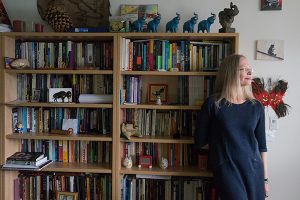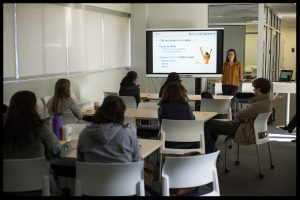http://www.youtube.com/watch?v=UBirdDmKnEo
By Barry Zepel
Silicon Valley is considered by many to be the technology capital of the world and what happens here has a profound influence on the entire world. As San Jose State University continues to prepare students to join the 21st-century workforce, the College of Applied Sciences and Arts (CASA) encourages many of its undergraduates to take at least one academic course abroad, taught by an SJSU faculty member, before they earn their degree.
Unbounded Learning, one of the major goals established by the Vision 2017 initiative, asked faculty and students to think outside the classrooms. CASA’s International Experience Initiative began in fall 2015 and now requires students enrolled in majors in five schools or departments within the college – School of Journalism and Mass Communications and the departments of Occupational Therapy, Hospitality Management, Kinesiology, and Justice Studies – to complete the requirement. About 175 students are anticipated to participate in eleven faculty-led programs with CASA faculty in 2017 (additional faculty-led programs are offered by faculty in other colleges as well).
“The goal of CASA’s international experience requirement is to introduce students to international and intercultural perspectives as a way to prepare them to live and work in an increasingly globalized world,” said Pamela Richardson, an associate dean in CASA who oversees the International Experience Initiative.
Accompanied by SJSU faculty members on their international excursions, which usually last about three weeks, the destinations and cultures have been as diverse as the subjects studied.
Shirley Reekie, a professor in the Department of Kinesiology, is scheduled to lead her course in Sports, Culture and Recreation to the United Kingdom again this summer, while Deepa Singamsetti, lecturer in the Department of Nutrition, Food Science and Packaging, will return to Puerto Rico to lead courses in food, culture and the environment. She plans to do it again – in India – next winter. This summer Lynne Andonian, an associate professor of occupational therapy, and Ruth Rosenblum, an assistant professor of nursing, will repeat their 2016 course offering on interdisciplinary health care, again in Finland.
Diane Guerrazzi, an associate professor, and Halima Kazem, a lecturer, in the School of Mass Communications taught a class in Greece and Germany last summer that documented the path of refugees from Syria and other countries into Europe. They plan to take another class of 14 pupils to Greece and Italy this summer, again to cover the migration of refugees from Syria as well as other Middle East and African countries. During their upcoming three-week trip, the students will learn how to write and produce documentary broadcast reports while visiting refugee camps, relief agencies and a small town in Italy that has taken in an extraordinary number of refugees. Both Guerrazzi (broadcast) and Kazem (print) have extensive international reporting experience.
“A faculty member from the Walter Cronkite School of Journalism at Arizona State University told me how impressed he is with the international experience we offer our students,” said Guerrazzi, who also serves as SJSU’s representative on the California State University Council of International Programs. “I know from my own experience of leading these international educational trips that every person would tell you how life-altering they are. They certainly broaden their world perspectives.”
Megan Dejan, an SJSU senior who studied global leadership in Paris last summer with Dr. Matt Cabot’s class, agrees with Guerrazzi about the positive impact that the international learning experience had on her. The public relations major said she “had the opportunity to network and work closely alongside Europe’s top strategic communications firms, including the International Chamber of Commerce, Ubisoft … as well as the European Union.”
“This class opened my mind to become more globally competent (and) to become a young global leader,” Dejan said. “I am now inspired to travel and build my global network through my passion with public relations.”
Jayne Balthazar, an SJSU alumna, traveled to Paris in summer 2014 with Linda Levine, a lecturer in the Department of Health Science and Recreation.
“It was the first time I earned a scholarship and traveled independently (of my family) and shared a room with someone I barely knew,” Balthazar said, noting that she also raised money on her own to take the trip.
She said Levine and her husband David Buseck, an SJSU lecturer and co-instructor of the program, helped the students navigate the city and learn many things.
“When we first arrived in Paris, we didn’t know how to use the Metro, but we had Linda and David there to help us.”
Students who seek an alternative from the study abroad requirement – due to financial hardship, serious personal life situation, or physical limitations – may petition CASA to substitute a one-unit online seminar in conjunction with 20 hours of volunteer service to a San Jose organization that helps individuals or groups and represents a cultural heritage other than their own.
Further information about the program is available online.

